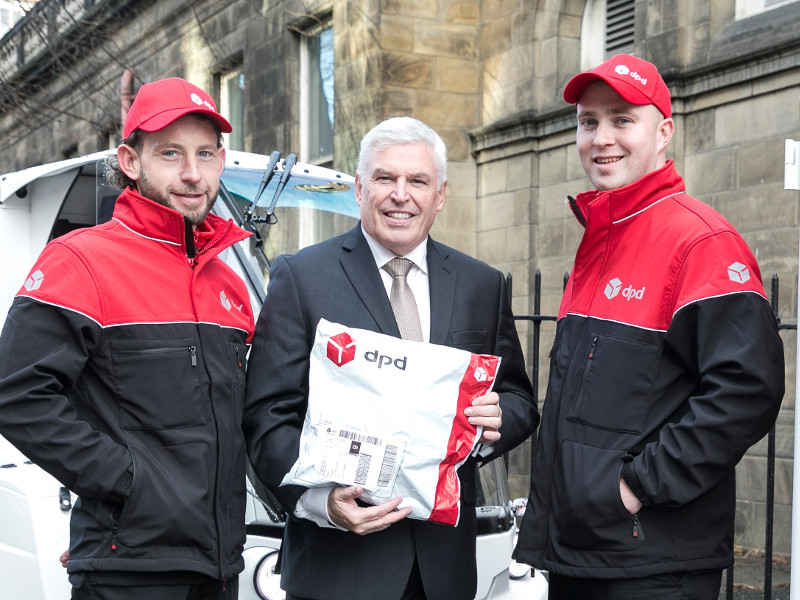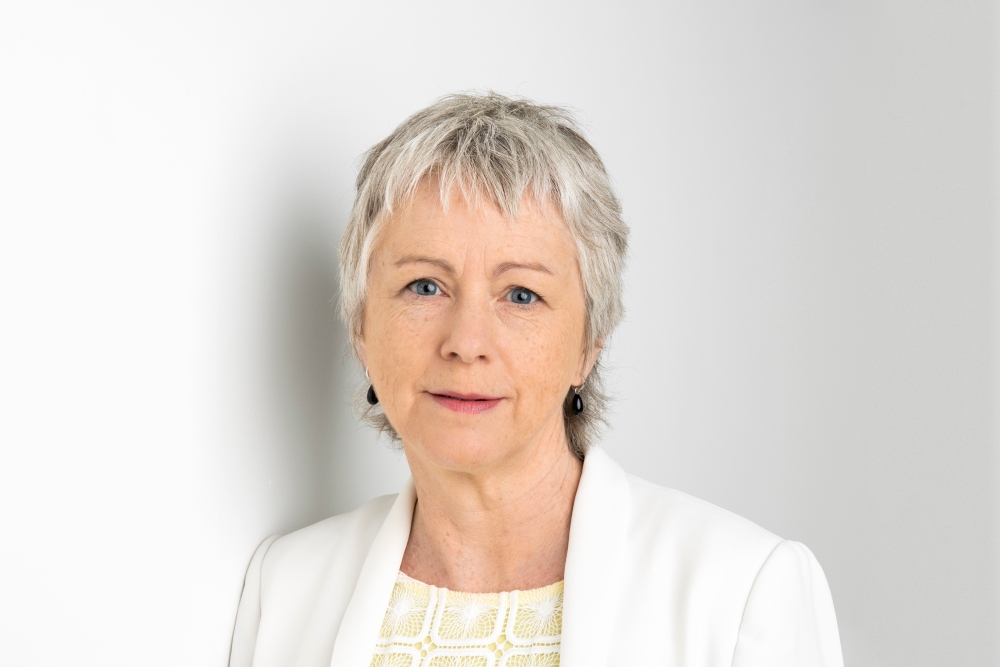Podcast Ep 52: DPD Ireland CEO Des Travers talks about how the pandemic drove digital business in Ireland and his sustainability drive to an all-electric future.
Just over a year since Ireland went into what seemed like a never-ending sequence of lockdowns, DPD Ireland’s CEO Des Travers admits he has never seen a year like it.
At the time of the first lockdown his company’s leadership team was engaged in worst-case scenario planning, figuring out what would happen if business declined 25pc, or 50pc or by 75pc. “It was the biggest waste of two weeks of my life. I wished instead that I had gone and spent the time sitting on a beach somewhere before they were closed. Instead, we saw the biggest surge in parcel deliveries we’d ever seen in our lives.”
“There were many challenges that we absolutely smashed in the last 12 months. But then again, we believe that the next 12 months will be equally challenging”
2020 was a bumper year for DPD thanks to the massive surge in online orders due to the pandemic. The company hired 820 extra people to manage the surge. The business recorded a 39pc increase in deliveries from 11.8m parcels between January and November 2019 to 16.4m during the same period in 2020.
DPD found the time to innovate and made considerable strides in green energy, launching an electric depot and putting 25 electric vehicles on the road. It also launched a “green last mile” initiative whereby a double decker bus functioned as a kind of mobile depot with electric bikes with mini trailers going the final distance.
DPD delivered 80,000 parcels delivered via electric means last year and plans to have over 160 electric vehicles on Irish roads by 2025.
It also started a new Eco Fund to bring communities closer together during the pandemic. It is being funded by the sale of waste material from the parcel delivery company’s central hub in Athlone.
Supply and demand
Speaking with ThinkBusiness, Travers said that as more businesses and consumers embraced e-commerce as the pandemic wore on, it created a logistical nightmare for the DPD and at one point was 95,000 parcels behind. “We were 30,000 parcels behind for six weeks before we finally got on top of it. We managed to scale up and when I say scale up I’m talking 500 extra vehicles on the road. We did things that we never ever believed in our lives we would do.
“We built three new depots in Dublin and we worked and worked morning, noon and night to get on top of the volume that was coming. Nobody knew what to forecast because at the time we thought it would be a three-month wonder and we’d be back to normal by September.
“In reality, and what’s happened since, is this is the new normal. And we’re just seeing volumes rise and rise for the best part of a year now.”
Travers said the biggest shift was how businesses transformed digitally to support customers in various industries. “It was interesting because quite a lot had websites but didn’t have the ability to sell anything on them, they were just information sites. Some of the websites that Irish companies have built since have been absolutely phenomenal and fabulous.
“Some of the bigger companies really struggled because of the size and scope of their products and they had to try and get online as quickly as they could and then others didn’t just have the distribution capability to be able to pick, pack and process the order.
“Some were able to learn very quickly while others had to go through a lot of pain to learn the process and get themselves to a place where they could actually do it. But most of them by now have gotten themselves into gear. And for ourselves all that has meant is just more and more parcels.”
Scaling up
When ThinkBusiness first spoke to Travers more than a year ago, the biggest threat on the horizon was the impact of Brexit and the challenge was gearing up for the Black Friday sales surge.
“If you haven’t gone online, then you must have a very good reason why you don’t want to put your business online because it has been staring you in the face for the last 12 months, that’s where the opportunities are and that’s where the revenue is”
The Glasgow native has lived in Ireland for more than 30 years. DPD was established in Ireland in 1986 as Interlink Ireland. In 2008 it was acquired by the French post office La Poste and rebranded as DPD Ireland. Prior to the pandemic, the company employed more than 1,100 people across 34 depots, including a €33m investment in its Athlone sortation hub which could handle more than 21,000 parcels an hour.
But since the pandemic more than 820 additional people had been hired at peak demand to handle a 40pc increase in delivery volumes. At least 600 of the extra drivers are still delivering.
“One of the things I am most proud of in the past year wasn’t just that we got through the pandemic, we got through every day and every parcel was delivered the way it should have been, it was that we expanded six or seven key sites. We took some long leases on big premises that has enabled us to scale up and be able to get more and more people out in vans and out to deliver for us. And that wasn’t just in Dublin. The biggest site we have now is in Cork and we’ve got 80,000 sq ft in Little Island. It’s a massive site and with more than 105 vans.”
Scaling up to deal with extra parcels is not just a physical challenge but also an HR challenge and DPD had to move fast to accommodate additional IT people.
“There were many challenges that we absolutely smashed in the last 12 months. But then again, we believe that the next 12 months will be equally challenging.”
Travers said that “Covid” volumes have only just kept coming, getting stronger and stronger all the time.
“So for our business now has a base level on a normal day of 150,000 parcels in the south and 70,000 parcels in the North – about 220,000. When I was last talking to you our biggest night was 146,000, so that will give you an idea of the size.”
Sustainability journey

For most people living through the various lockdowns, the rise of e-commerce and online shopping was unstoppable. For consumers it was about practicalities, for businesses it was about survival. For Travers, there is no going back to traditional norms, even if the majority of the population is vaccinated.
“This should be no secret to anybody, but in the future the only way to deliver a parcel will be via electric in some form or fashion”
His advice to businesses is stark. “First of all, if you haven’t gone online, then you must have a very good reason why you don’t want to put your business online because it has been staring you in the face for the last 12 months, that’s where the opportunities are and that’s where the revenue is.
“You obviously can live through the pandemic and you can live through having stock in your shop and certain doors closed. But for us, it is really a big opportunity to move that stock and get it delivered and have it off your books and certainly improve your P&L (profit and loss).
“For those that have gone online it is about having the range and the ability to have your supply chain in such good shape that you can deliver anything to anybody as quickly as possible.
“There’s a surge to move away from next day to same day and there are certain products that suits like food, but there are other markets that won’t suit. So you have to pick your product, pick your niche and go after it.
“Brexit has changed the landscape as well. It didn’t start off very well but all of the carriers are getting to grips with it. The choice now is that for anything that is coming from the UK you have to be willing to pay the VAT and duty, but for some products, brands or particular fashion items then you’ll have to be willing to pay that bit extra for it.”
For Travers and for DPD’s parent company La Poste, the enduring challenge is to ensure that the business becomes as sustainable as possible. “People talk about this as if it is a choice, but it is absolutely not a choice for us.”
He said that the ambition would be to move DPD’s fleet to be entirely electric if the technology allowed for it. “The only reason we are not there today is because the technologies are not able to support the routes that we have. You can only do a certain amount of mileage on electric, but unfortunately the charging point facilities are not good enough or quick enough to enable us to go bigger and faster. But we will go bigger and faster. This should be no secret to anybody, but in the future the only way to deliver a parcel will be via electric in some form or fashion.”
As we spoke, Travers said that DPD is already working to deploy a trial of deliveries by drone in Westmeath. “We’ve been working with a drone company for more than a year on this to see exactly wat we can do. We’re always looking to innovate. We did electric bikes over the Christmas period in Drogheda and Bettystown and we had 10 bikes do 1,000 deliveries per day over six to eight weeks using a bus as a mobile depot. We learned that it worked fine on a dry day but too good on a wet day.
“We are trying to find the most carbon friendly way to do deliveries. And we will continue to strive. We are already carbon neutral anyway because we offset our carbon, but that’s just putting a few pounds into it. What we really want to do is actually reduce our carbon footprint, which is a different challenge altogether.”
The logistical challenge of Covid-19 in terms of rising e-commerce volumes paled beside the challenge of keeping staff safe. “85pc of people who worked at our sites during the daytime now work at home. The only people allowed on site are actually people who have to handle parcels at night-time and of course we have had to ensure social distancing. Couple that with a backlog of 95,000 parcels and you have a whole lot of challenges. You’re trying to find a balance between getting those parcels out and keeping your people safe,” he concluded.
“And I think the thing we should be most proud of this year is that we managed to do both.”
By John Kennedy (john.kennedy3@boi.com)
Published: 23 March 2021






